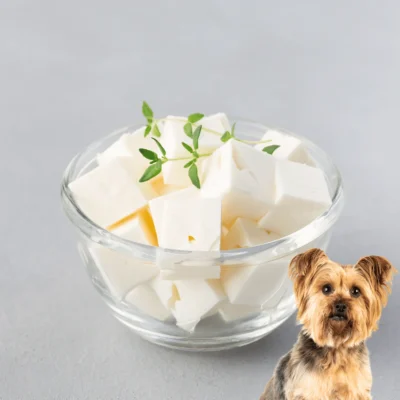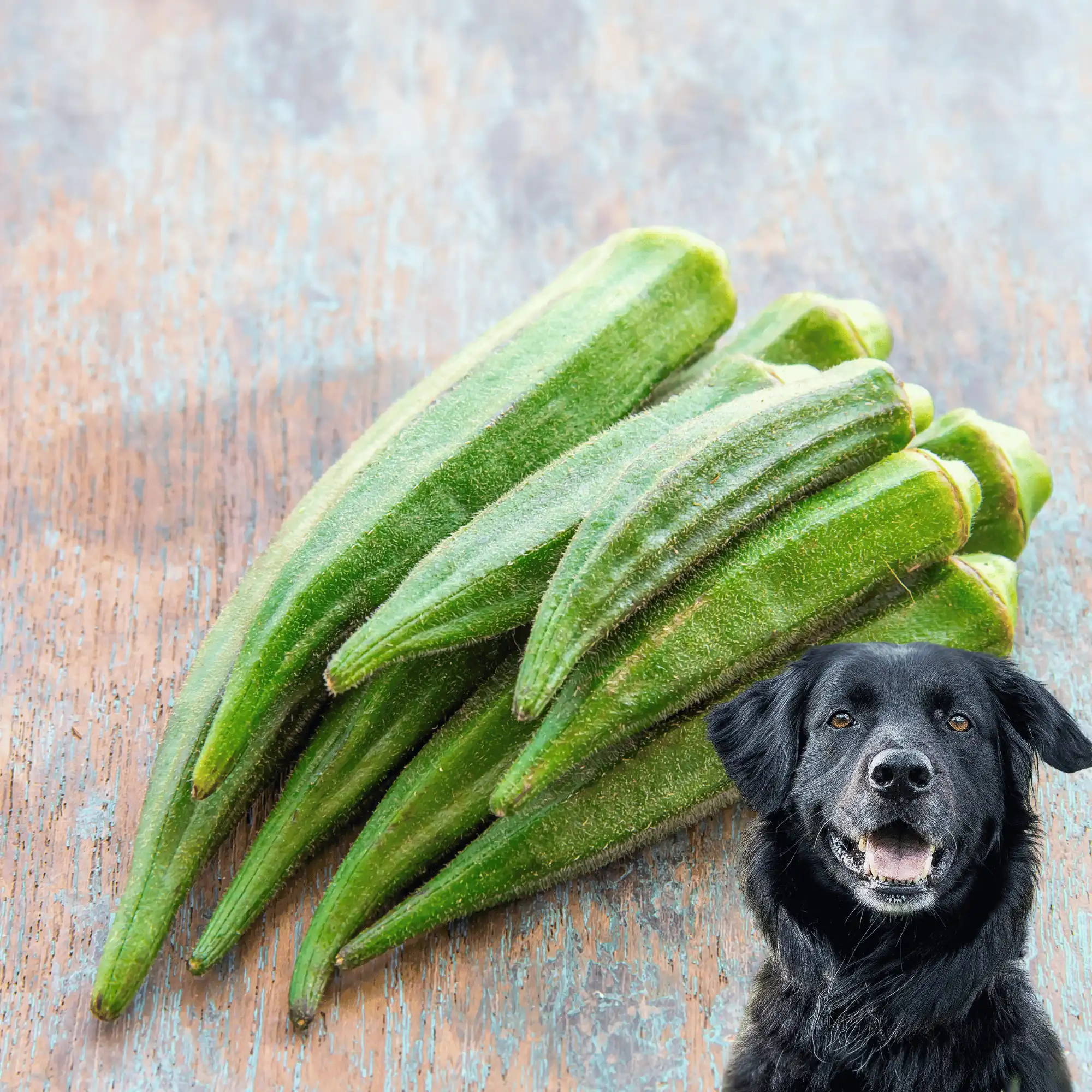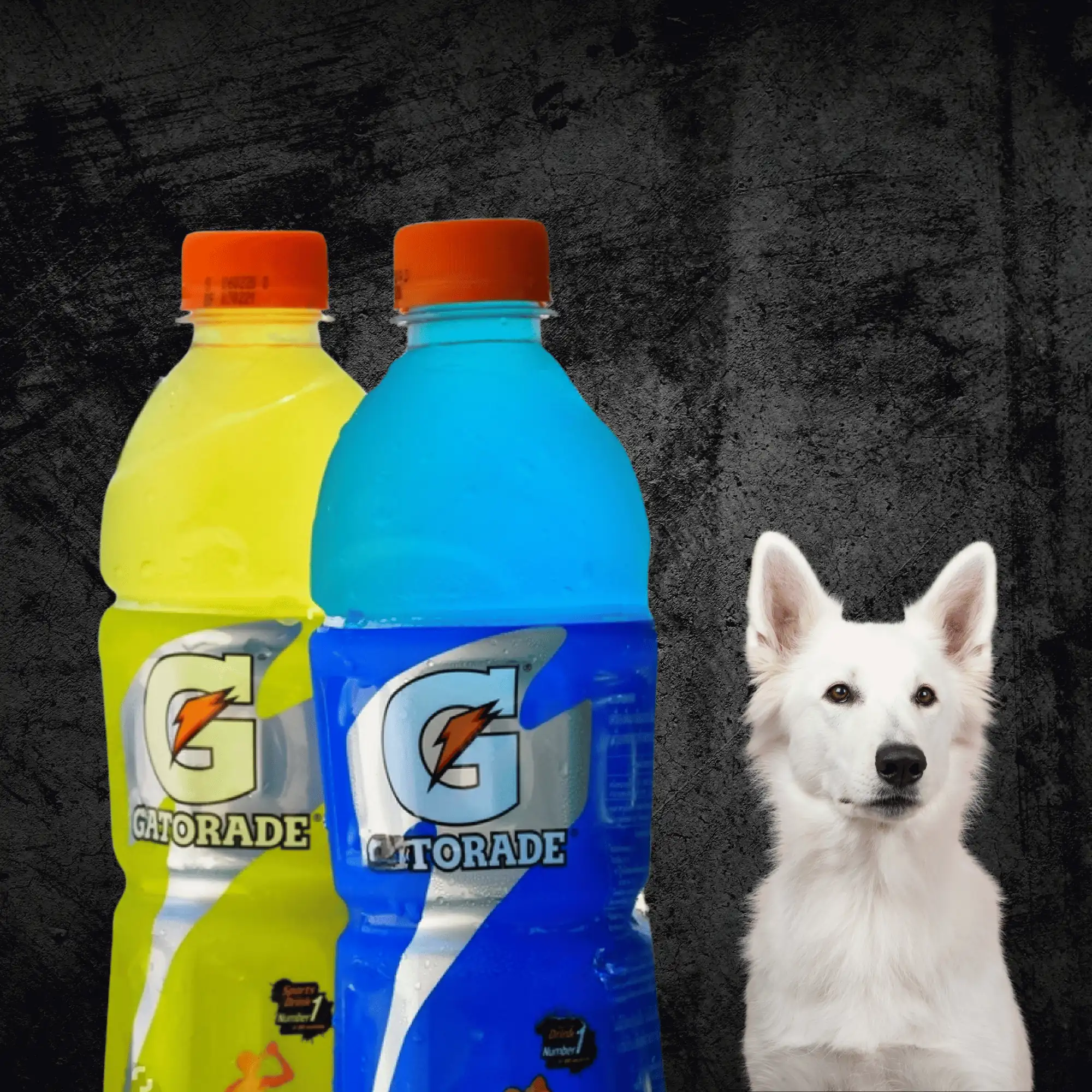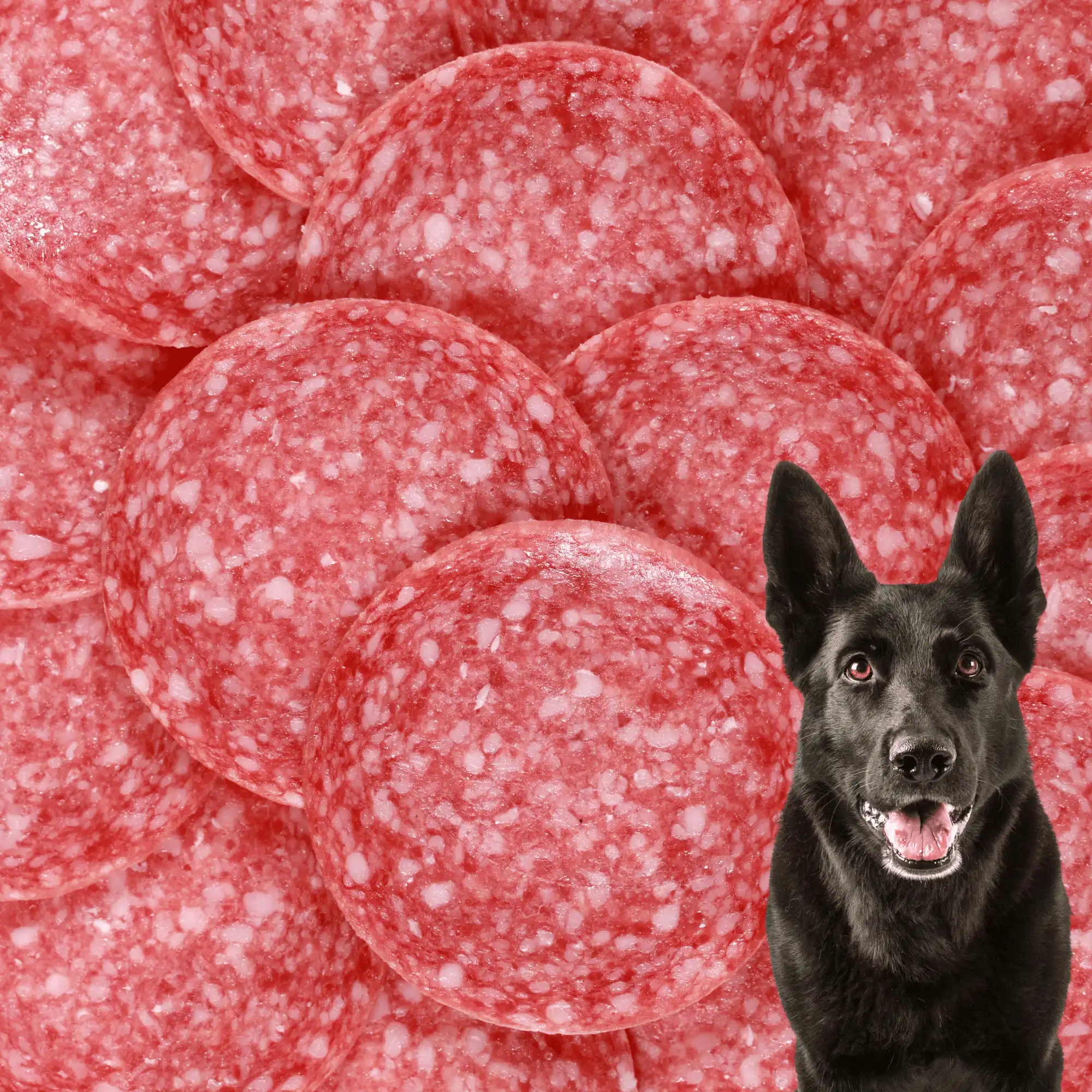As devoted pet owners, we often take pleasure in sharing our favorite foods with our beloved canine companions. However, not all human foods are safe for dogs, and it’s crucial to understand the potential risks and benefits before offering them to our furry friends. Feta cheese, with its distinct flavor and creamy texture, is a staple in many kitchens, prompting the question: Can dogs eat feta cheese?
In this article, we’ll explore the nutritional composition of feta cheese, discuss its potential benefits and risks for dogs, and provide guidelines for responsible pet nutrition, helping pet owners make informed decisions about what treats to offer their beloved four-legged companions.
In this blog post, we’ll explore the following topics:
- What is Feta Cheese?
- Can Dogs Eat Feta Cheese?
- Nutritional Content of Feta Cheese
- Health Benefits of Beta Cheese for Dogs
- Potential Risks of Beta Cheese for Dogs
- Identifying Signs of Lactose Intolerance in Dogs
- How to Safely Feed Feta Cheese to Your Dog
- Substitutes for Feta Cheese in Your Dog’s Diet
What is Feta Cheese?

Feta cheese is a type of cheese that originated in Greece and is traditionally made from sheep’s milk or a combination of sheep’s and goat’s milk. It is a soft, crumbly cheese with a tangy flavor and a slightly salty taste.
Feta cheese is known for its characteristic white color and crumbly texture. It is typically aged in brine, which gives it a salty flavor and helps preserve it. Feta cheese is commonly used in Mediterranean cuisine, where it is often crumbled over salads, used as a filling in pastries, or served as a topping for various dishes.
In addition to its culinary versatility, feta cheese also offers nutritional benefits. It is a good source of protein, calcium, phosphorus, and vitamins like vitamin A and vitamin B12. However, due to its high fat and salt content, feta cheese should be consumed in moderation, both for humans and for dogs.
Can Dogs Eat Feta Cheese?
Yes, dogs can eat feta cheese, but it should be in moderation. While feta cheese isn’t toxic to dogs, it’s crucial to recognize that their nutritional needs differ from those of humans. Thus, it’s essential to feed them foods suitable for their dietary requirements.
Feta cheese, also known as fromage, is lower in lactose compared to some other cheeses, which makes it a bit easier for dogs to digest. However, it’s still high in fat and salt, so excessive consumption can lead to digestive upset or even pancreatitis, especially in dogs with sensitive stomachs or those prone to obesity.
If you’re considering giving your dog feta cheese as an occasional treat, it’s best to offer only a small amount and monitor for any adverse reactions. Additionally, make sure the feta cheese is plain and not seasoned with ingredients like garlic or onions, which can be toxic to dogs. As always, it’s a good idea to consult with your veterinarian before introducing new foods to your dog’s diet to ensure they are safe and appropriate.
Nutritional Content of Feta Cheese:
Feta cheese boasts a rich taste and distinct nutritional profile. Here’s a breakdown:
Nutrient Composition (per 100g):
| Nutrient | Amount per 100g |
| Calories | 250 kcal |
| Fat | 21g |
| Protein | 14g |
| Sodium | 1,120mg |
| Carbohydrates | 4g |
| Lactose | 1.2g |
Vitamins and Minerals:
- Phosphorus
- Copper
- Zinc
- Manganese
- Selenium
- Vitamin B6
While the protein content might seem enticing for dogs, the high sodium and fat levels might not suit their dietary requirements. Additionally, feta cheese contains lactose due to its milk base, which could be problematic for lactose-intolerant dogs or those with uncertain tolerances.
Lactose can pose digestion challenges for some dogs. Therefore, it’s essential to consider your dog’s individual dietary needs and consult with a veterinarian if unsure.
Health Benefits of Beta Cheese for Dogs:
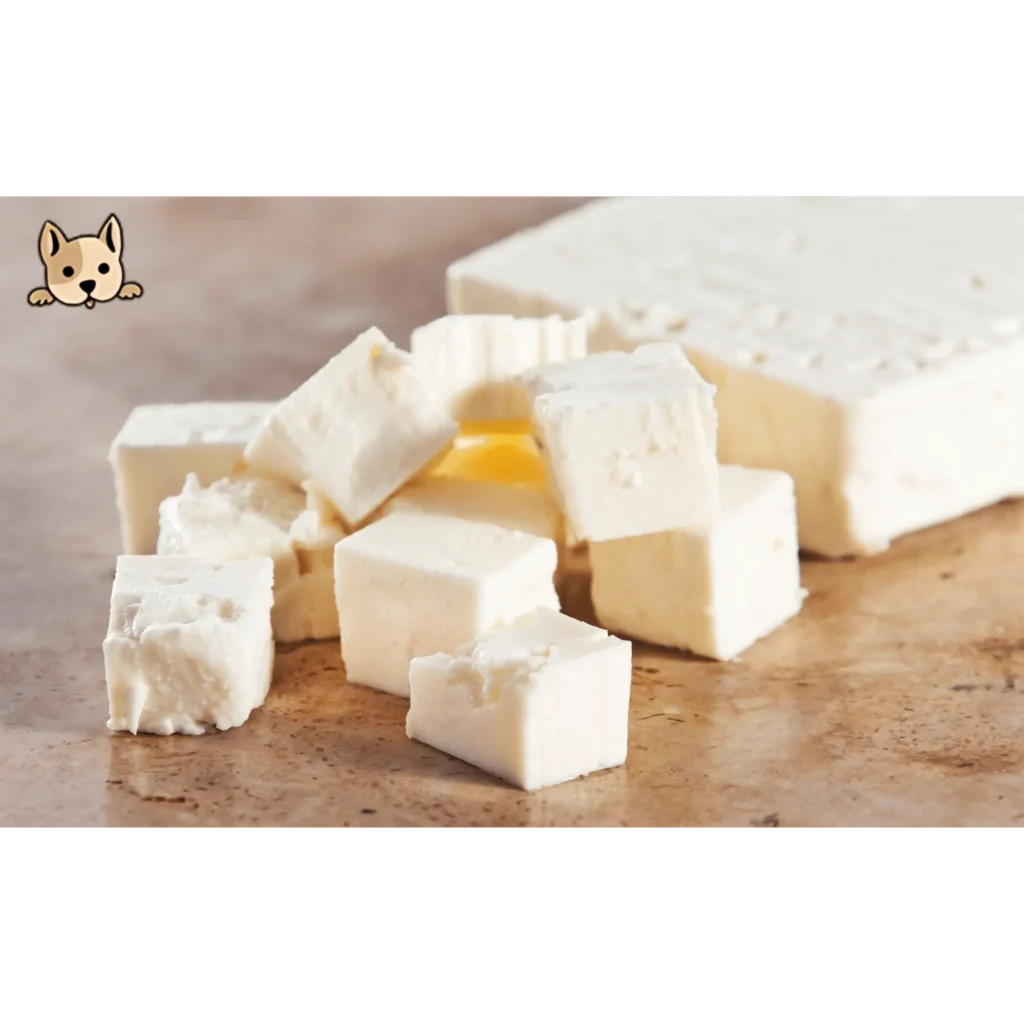
Feta cheese, like other types of cheese, can offer some nutritional benefits to dogs when given in moderation. Here are a few potential health perks:
1. Protein:
The protein in feta cheese provides essential amino acids necessary for muscle maintenance and growth in dogs. Adequate protein intake supports the development of lean muscle mass, which is important for mobility and overall strength. Protein is involved in the repair and regeneration of tissues in the body, including muscles, skin, and organs.
Feta cheese contains various amino acids, which are the building blocks of protein. These amino acids play important roles in various bodily functions, including enzyme production, immune function, and hormone regulation.
2. Calcium:
Calcium is a crucial component of bone tissue, providing strength and structure to bones. Adequate calcium intake is essential for maintaining healthy bones and teeth in dogs. It helps support proper bone development in puppies and prevents bone density loss in adult and senior dogs.
Calcium is involved in the blood clotting process, which is essential for wound healing and preventing excessive bleeding in dogs. It helps activate certain clotting factors in the blood to form a clot and stop bleeding when a blood vessel is injured.
3. Phosphorus:
Phosphorus is involved in various metabolic processes that produce and store energy in the body. It participates in the synthesis of adenosine triphosphate (ATP), which is the primary energy currency of cells. Phosphorus helps facilitate the conversion of nutrients into usable energy for bodily functions and activities.
Phosphorus is a structural component of cell membranes and is involved in maintaining cell structure and integrity. It plays a role in cell signaling, enzyme activation, and the regulation of cellular processes essential for overall health and function.
4. Vitamins:
Feta cheese contains vitamin A, which is essential for maintaining healthy vision, skin, and coat in dogs. Vitamin A also supports immune function and helps regulate cell growth and differentiation.
Feta cheese is a source of vitamin B12, which is important for energy metabolism, the formation of red blood cells, and nervous system function in dogs. Adequate vitamin B12 intake is crucial for overall health and vitality.
5. Moderate Lactose Content:
Feta cheese generally has a lower lactose content compared to some other types of cheese. Lactose is the sugar found in milk, and some dogs may have difficulty digesting it due to a deficiency of the enzyme lactase, which is needed to break down lactose.
The moderate lactose content in feta cheese means that it may be easier for some dogs to digest compared to cheeses with higher lactose levels. However, it’s important to note that even though feta cheese contains less lactose, it’s still a dairy product and should be given to dogs in moderation.
However, it’s important to remember that while feta cheese can provide some nutritional benefits, it should only be given as an occasional treat and in small quantities.
Potential Risks of Feta Cheese for Dogs:
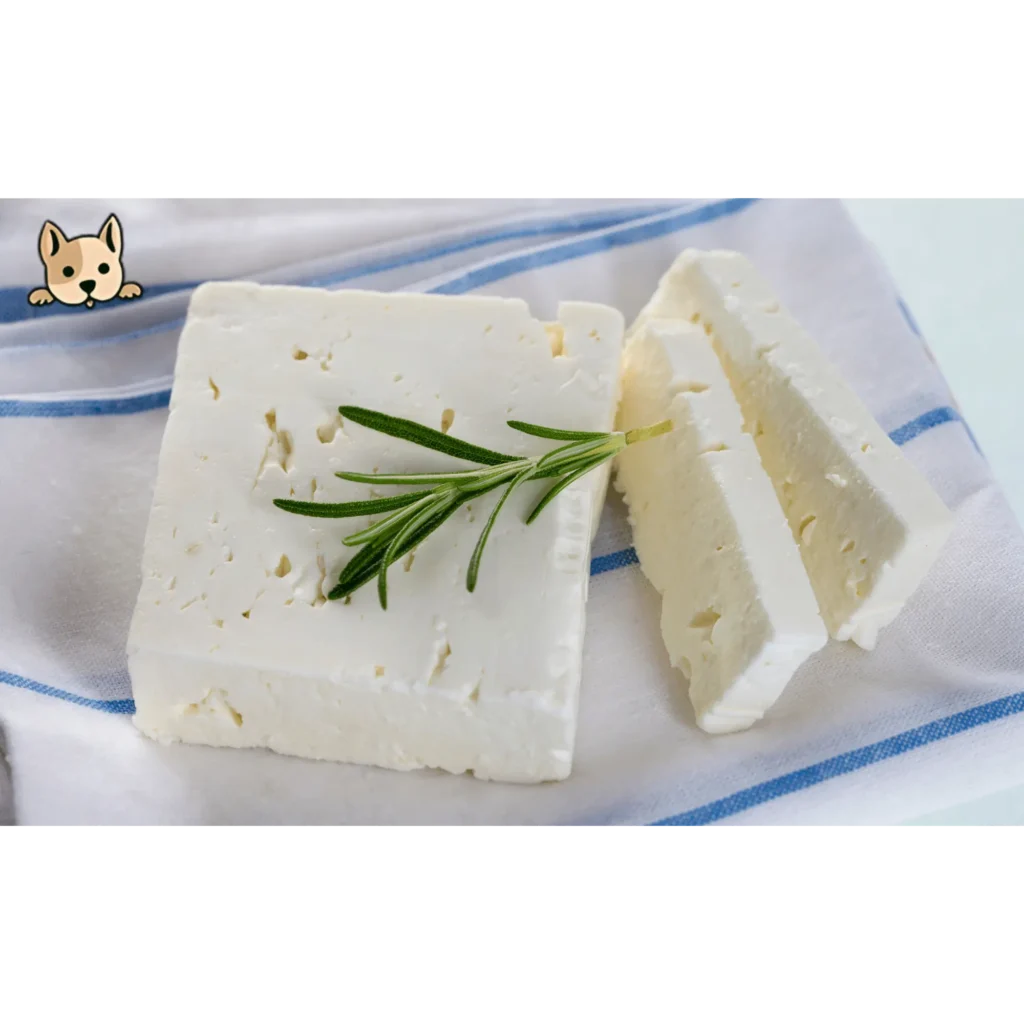
While feta cheese can offer some nutritional benefits for dogs when given in moderation, there are also potential risks associated with feeding it to dogs:
1. High Fat Content:
Feta cheese is high in fat, which can contribute to obesity and weight gain in dogs if fed in excess. Overconsumption of high-fat foods can also increase the risk of pancreatitis, a painful and potentially life-threatening inflammation of the pancreas.
2. High Sodium Content:
Feta cheese is salty, and excessive sodium intake can lead to sodium ion poisoning or salt toxicity in dogs. Symptoms of salt toxicity may include vomiting, diarrhea, excessive thirst, dehydration, lethargy, and, in severe cases, seizures or death.
3. Potential Allergic Reactions:
Dogs can develop allergies or sensitivities to certain foods, including dairy products like cheese. Allergic reactions may manifest as itching, skin rashes, ear infections, digestive upset, or respiratory symptoms.
4. Risk of Choking or Gastrointestinal Obstruction:
Feta cheese can be crumbly, and dogs may swallow large chunks without properly chewing, increasing the risk of choking or gastrointestinal obstruction.
Given these potential risks, it’s important to offer feta cheese to dogs only as an occasional treat and in small quantities. Additionally, it’s advisable to choose plain feta cheese without added seasonings or ingredients that may be harmful to dogs.
Identifying Signs of Lactose Intolerance in Dogs:
While feta cheese has a lower lactose content compared to some other dairy products, it still contains lactose. Signs that your dog might be lactose intolerant include:
- Diarrhea
- Excessive gas
- Bloating
- Abdominal discomfort
- Changes in stool color, such as yellow stool, due to digestive issues
These symptoms may take a few hours to appear, so it’s essential to keep an eye on your dog after introducing new foods. If you’re unsure, consult a veterinarian for guidance.
How to Safely Feed Feta Cheese to Your Dog?
When offering feta cheese to your dog, do so in moderation as an occasional treat. Choose plain varieties without added seasonings or ingredients that could be harmful to dogs. Start with small portions and monitor for any adverse reactions, especially if it’s your dog’s first time trying it.
Be mindful of the sodium content and consider your dog’s individual health needs. Avoid giving feta cheese to dogs with obesity, pancreatitis, or gastrointestinal sensitivities. If using it as a training treat, cut it into small pieces to prevent overfeeding.
Remember that feta cheese should not replace your dog’s regular meals, and their overall diet should be balanced and nutritionally complete. Consult with your veterinarian before introducing new foods to your dog’s diet, including feta cheese, to ensure it’s safe and appropriate for them.
Substitutes for Feta Cheese in Your Dog’s Diet:

While feta cheese might not be the best choice for dogs, there are plenty of tasty alternatives available. Keep in mind that while some options might be better tolerated, there are still risks associated with them. It’s important to note that if your dog is lactose intolerant, it’s best to avoid all types of cheese.
Dog-Friendly Cheese Alternatives:
| Cheese Type | Benefits | Considerations |
| Cottage Cheese | Low in fat, High in protein | Choose unflavored varieties |
| Cream Cheese | Soft and easily digestible | Opt for unflavored with no additives |
| Cheddar Cheese | Tasty and generally well-tolerated | Offer in moderation |
Remember, always consider your dog’s individual dietary needs and any existing health conditions. Consult with your veterinarian for personalized recommendations tailored to your furry friend’s specific requirements.
Final Thought:
While dogs can technically eat feta cheese, it should only be given in moderation and as an occasional treat. While feta cheese contains some beneficial nutrients like protein and calcium, it also poses potential risks due to its high fat and sodium content. Additionally, some dogs may have difficulty digesting lactose, which is present in all dairy products, including feta cheese.
It’s essential to consider your dog’s individual dietary needs, health status, and any existing health conditions before offering them fromage or any other human foods. If you’re unsure about whether feta cheese is suitable for your dog, it’s always best to consult with your veterinarian for personalized guidance and recommendations.
Ultimately, while it can be tempting to share our favorite foods with our furry companions, it’s crucial to prioritize their health and well-being by feeding them a balanced and nutritionally complete diet tailored to their specific needs. By making informed decisions about what treats to offer our dogs, we can help ensure they live long, healthy, and happy lives.
FAQs:
What cheese can dogs eat?
Yes, dogs can eat cheese like cheddar, mozzarella, and cottage cheese, but they should avoid blue-veined varieties like Stilton and Roquefort as they can be toxic. Moderation is crucial due to cheese’s high fat content.
Can dogs eat olives and feta cheese?
While goat and feta cheese aren’t inherently toxic to dogs, it’s best to avoid them due to their higher sodium and fat content. Additionally, some dogs are lactose intolerant, further emphasizing the need to steer clear of cheese for your pup.
Are any cheeses toxic to dogs?
The simple answer to whether dogs can eat cheese depends on the individual dog. Cheese itself isn’t poisonous to dogs, except for varieties like blue cheese. However, some cheeses contain added ingredients like onion, garlic, herbs, or other additions that could be harmful to dogs.
What are the best human foods for dogs?
Some of the best foods to share with your dog include strawberries, watermelon, apples, sweet potatoes, carrots, green beans, brown or white rice, chicken, turkey, and Greek yogurt. These options offer nutritional benefits and are generally safe for canine consumption.






